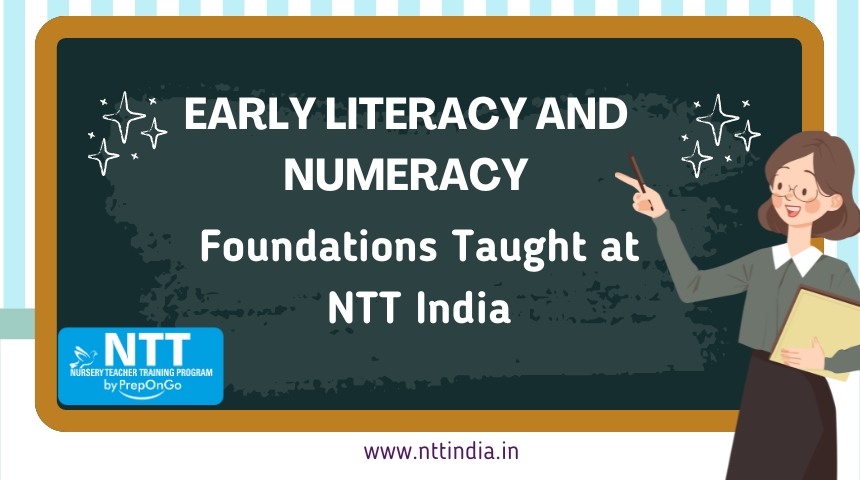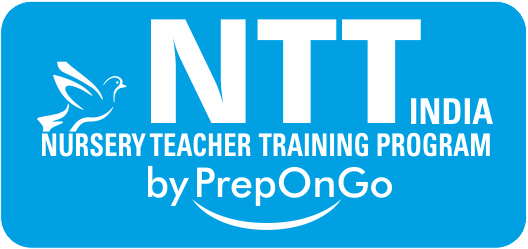Early Literacy and Numeracy: Foundations Taught at NTT India

Early literacy and numeracy are essential building blocks for a child’s educational journey. At NTT India, our curriculum is designed to lay a strong foundation in these critical areas, ensuring that young learners develop the skills they need to succeed in school and beyond. In this article, we’ll explore how NTT India prepares nursery teachers to teach early literacy and numeracy effectively, focusing on the foundational skills and strategies that make our program stand out.
The Importance of Early Literacy and Numeracy
Early literacy and numeracy are crucial for several reasons:
- Academic Success: Children with strong literacy and numeracy skills are better prepared for formal schooling.
- Cognitive Development: These skills support overall cognitive development, including problem-solving and critical thinking.
- Confidence and Motivation: Mastering early literacy and numeracy boosts children’s confidence and fosters a love for learning.
Early Literacy: Foundations Taught at NTT India
Early literacy encompasses the skills children need to develop reading and writing abilities. At NTT India, we focus on the following foundational literacy skills:
- Phonemic Awareness
Phonemic awareness is the ability to hear, identify, and manipulate individual sounds (phonemes) in spoken words. We teach nursery teachers to use activities such as rhyming games, sound matching, and segmenting words into individual sounds to develop this critical skill.
- Alphabet Knowledge
Understanding the alphabet is a fundamental step in early literacy. Our curriculum includes strategies for teaching letter recognition, letter-sound correspondence, and the ability to write letters. Teachers learn to use fun and engaging activities like alphabet songs, flashcards, and hands-on letter formation exercises.
- Vocabulary Development
A robust vocabulary is essential for reading comprehension and communication. We train teachers to enhance children’s vocabulary through interactive read-alouds, storytelling, and conversations. Encouraging children to ask questions and explore new words in various contexts is a key part of our approach.
- Print Awareness
Print awareness involves recognizing the forms and functions of written language. Teachers learn to create a print-rich environment by labeling classroom objects, using big books, and demonstrating how to follow text from left to right. These practices help children understand that print carries meaning.
- Comprehension Skills
Comprehension is the ultimate goal of reading. We emphasize techniques for building comprehension skills, such as asking open-ended questions during read-alouds, encouraging children to predict story outcomes, and discussing story elements like characters, settings, and events.
Early Numeracy: Foundations Taught at NTT India
Early numeracy skills prepare children for more advanced mathematical concepts. The NTT India curriculum covers these foundational numeracy skills:
- Number Sense
Number sense is the ability to understand and work with numbers. Teachers are trained to help children recognize numbers, count objects, and understand basic concepts like more and less. Activities such as number games, counting songs, and hands-on counting with manipulatives are integral to our approach.
- Pattern Recognition
Recognizing and creating patterns is a fundamental mathematical skill. Our curriculum includes activities that involve sorting, classifying, and sequencing objects. Teachers learn to use pattern blocks, beads, and everyday items to help children identify and extend patterns.
- Basic Operations
Understanding basic mathematical operations like addition and subtraction is crucial. We teach nursery teachers to introduce these concepts through simple, concrete activities. For example, using objects like counters or blocks to visually represent adding and taking away helps children grasp these operations.
- Spatial Awareness
Spatial awareness involves understanding shapes, sizes, and the relationships between objects. Teachers learn to engage children in activities that build spatial skills, such as puzzle-solving, block building, and exploring geometric shapes.
- Measurement
Basic measurement skills, such as comparing lengths, weights, and volumes, are part of our numeracy training. Teachers use activities like measuring items with non-standard units (e.g., using a string or hands) and comparing objects to help children understand measurement concepts.
Integrating Literacy and Numeracy
At NTT India, we believe in integrating literacy and numeracy into everyday activities. Teachers are trained to create thematic units that combine both areas, such as using stories that involve counting or measuring objects mentioned in the text. This integrated approach makes learning more meaningful and enjoyable for children.
Conclusion
Early literacy and numeracy are vital components of a child’s education, and NTT India is committed to providing nursery teachers with the tools and knowledge they need to teach these foundational skills effectively. By focusing on phonemic awareness, alphabet knowledge, vocabulary development, print awareness, comprehension, number sense, pattern recognition, basic operations, spatial awareness, and measurement, we ensure that our trainees are well-equipped to foster a love for reading and math in young children. With a strong foundation in early literacy and numeracy, children are better prepared for future academic success and lifelong learning.
